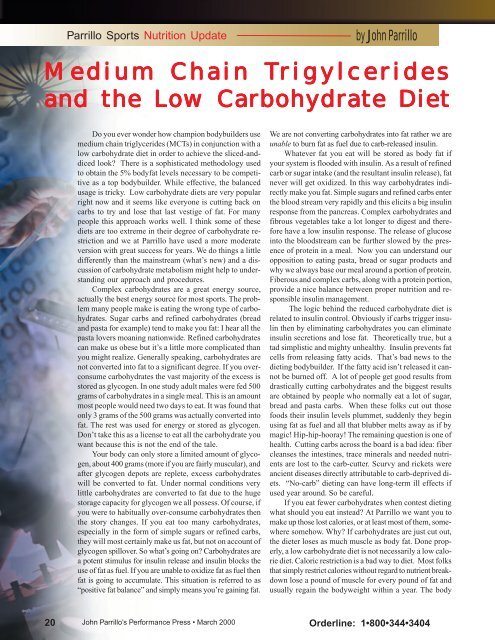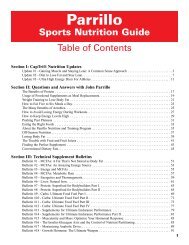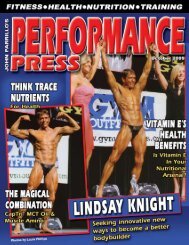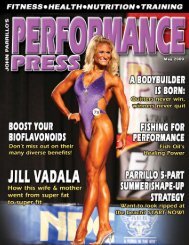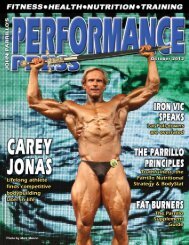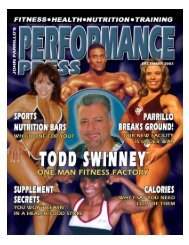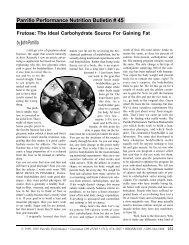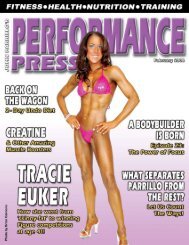A Monthly Magazine For All Bodybuilding, Fitness And - Parrillo ...
A Monthly Magazine For All Bodybuilding, Fitness And - Parrillo ...
A Monthly Magazine For All Bodybuilding, Fitness And - Parrillo ...
You also want an ePaper? Increase the reach of your titles
YUMPU automatically turns print PDFs into web optimized ePapers that Google loves.
<strong>Parrillo</strong> Sports Nutrition Update by John <strong>Parrillo</strong><br />
Medium Medium Chain Chain T TTrigylcerides<br />
T rigylcerides<br />
and and the the Low Low Carbohydrate Carbohydrate Diet<br />
Diet<br />
20<br />
Do you ever wonder how champion bodybuilders use<br />
medium chain triglycerides (MCTs) in conjunction with a<br />
low carbohydrate diet in order to achieve the sliced-anddiced<br />
look? There is a sophisticated methodology used<br />
to obtain the 5% bodyfat levels necessary to be competitive<br />
as a top bodybuilder. While effective, the balanced<br />
usage is tricky. Low carbohydrate diets are very popular<br />
right now and it seems like everyone is cutting back on<br />
carbs to try and lose that last vestige of fat. <strong>For</strong> many<br />
people this approach works well. I think some of these<br />
diets are too extreme in their degree of carbohydrate restriction<br />
and we at <strong>Parrillo</strong> have used a more moderate<br />
version with great success for years. We do things a little<br />
differently than the mainstream (what’s new) and a discussion<br />
of carbohydrate metabolism might help to understanding<br />
our approach and procedures.<br />
Complex carbohydrates are a great energy source,<br />
actually the best energy source for most sports. The problem<br />
many people make is eating the wrong type of carbohydrates.<br />
Sugar carbs and refined carbohydrates (bread<br />
and pasta for example) tend to make you fat: I hear all the<br />
pasta lovers moaning nationwide. Refined carbohydrates<br />
can make us obese but it’s a little more complicated than<br />
you might realize. Generally speaking, carbohydrates are<br />
not converted into fat to a significant degree. If you overconsume<br />
carbohydrates the vast majority of the excess is<br />
stored as glycogen. In one study adult males were fed 500<br />
grams of carbohydrates in a single meal. This is an amount<br />
most people would need two days to eat. It was found that<br />
only 3 grams of the 500 grams was actually converted into<br />
fat. The rest was used for energy or stored as glycogen.<br />
Don’t take this as a license to eat all the carbohydrate you<br />
want because this is not the end of the tale.<br />
Your body can only store a limited amount of glycogen,<br />
about 400 grams (more if you are fairly muscular), and<br />
after glycogen depots are replete, excess carbohydrates<br />
will be converted to fat. Under normal conditions very<br />
little carbohydrates are converted to fat due to the huge<br />
storage capacity for glycogen we all possess. Of course, if<br />
you were to habitually over-consume carbohydrates then<br />
the story changes. If you eat too many carbohydrates,<br />
especially in the form of simple sugars or refined carbs,<br />
they will most certainly make us fat, but not on account of<br />
glycogen spillover. So what’s going on? Carbohydrates are<br />
a potent stimulus for insulin release and insulin blocks the<br />
use of fat as fuel. If you are unable to oxidize fat as fuel then<br />
fat is going to accumulate. This situation is referred to as<br />
“positive fat balance” and simply means you’re gaining fat.<br />
We are not converting carbohydrates into fat rather we are<br />
unable to burn fat as fuel due to carb-released insulin.<br />
Whatever fat you eat will be stored as body fat if<br />
your system is flooded with insulin. As a result of refined<br />
carb or sugar intake (and the resultant insulin release), fat<br />
never will get oxidized. In this way carbohydrates indirectly<br />
make you fat. Simple sugars and refined carbs enter<br />
the blood stream very rapidly and this elicits a big insulin<br />
response from the pancreas. Complex carbohydrates and<br />
fibrous vegetables take a lot longer to digest and therefore<br />
have a low insulin response. The release of glucose<br />
into the bloodstream can be further slowed by the presence<br />
of protein in a meal. Now you can understand our<br />
opposition to eating pasta, bread or sugar products and<br />
why we always base our meal around a portion of protein.<br />
Fiberous and complex carbs, along with a protein portion,<br />
provide a nice balance between proper nutrition and responsible<br />
insulin management.<br />
The logic behind the reduced carbohydrate diet is<br />
related to insulin control. Obviously if carbs trigger insulin<br />
then by eliminating carbohydrates you can eliminate<br />
insulin secretions and lose fat. Theoretically true, but a<br />
tad simplistic and mighty unhealthy. Insulin prevents fat<br />
cells from releasing fatty acids. That’s bad news to the<br />
dieting bodybuilder. If the fatty acid isn’t released it cannot<br />
be burned off. A lot of people get good results from<br />
drastically cutting carbohydrates and the biggest results<br />
are obtained by people who normally eat a lot of sugar,<br />
bread and pasta carbs. When these folks cut out those<br />
foods their insulin levels plummet, suddenly they begin<br />
using fat as fuel and all that blubber melts away as if by<br />
magic! Hip-hip-hooray! The remaining question is one of<br />
health. Cutting carbs across the board is a bad idea: fiber<br />
cleanses the intestines, trace minerals and needed nutrients<br />
are lost to the carb-cutter. Scurvy and rickets were<br />
ancient diseases directly attributable to carb-deprived diets.<br />
“No-carb” dieting can have long-term ill effects if<br />
used year around. So be careful.<br />
If you eat fewer carbohydrates when contest dieting<br />
what should you eat instead? At <strong>Parrillo</strong> we want you to<br />
make up those lost calories, or at least most of them, somewhere<br />
somehow. Why? If carbohydrates are just cut out,<br />
the dieter loses as much muscle as body fat. Done properly,<br />
a low carbohydrate diet is not necessarily a low calorie<br />
diet. Caloric restriction is a bad way to diet. Most folks<br />
that simply restrict calories without regard to nutrient breakdown<br />
lose a pound of muscle for every pound of fat and<br />
usually regain the bodyweight within a year. The body<br />
John <strong>Parrillo</strong>’s Performance Press • March 2000 Orderline: 1•800•344•3404


